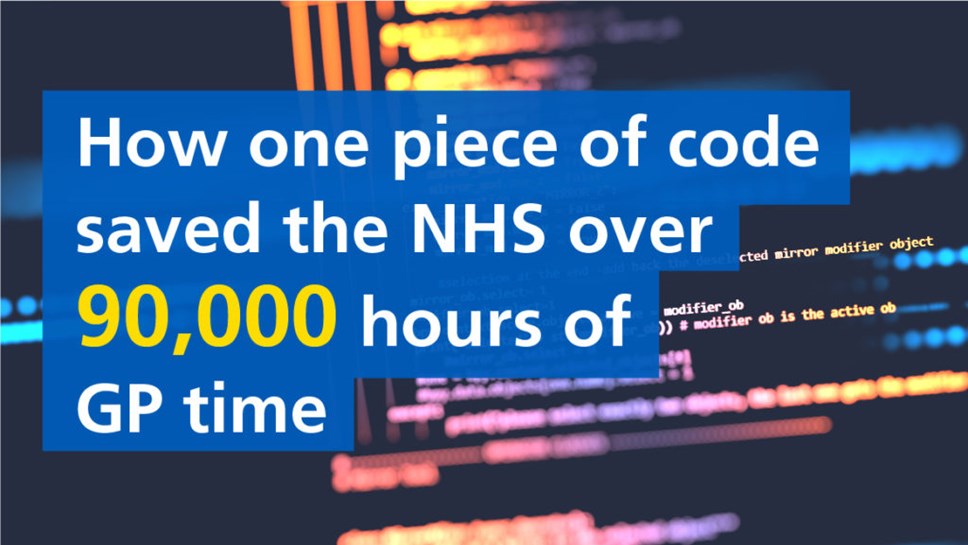
How one piece of code saved the NHS over 90,000 hours of GP time
Andy Mason, Data Warehouse and BI Manager for the NHS Business Services Authority (NHSBSA), explains how the ongoing development of a national prescribing data set allowed the NHSBSA to act quickly in response to COVID-19 and help GPs regain thousands of hours.
The NHSBSA is on a data journey. We’ve spent the last five years building a data ecosystem that will help us improve the services we provide to the public, patient safety, and patient outcomes, to name a few.
At the heart of this data ecosystem sits the NHSBSA Data Warehouse. The NHSBSA Data Warehouse takes data from across the NHSBSA and wider NHS, applies business logic and cleansing rules, and creates a single version of the truth to meet the reporting and analysis needs of its users.
In the example of prescriptions, the data flow looks like this:
The Problem
During the pandemic, a key objective was to reduce footfall in GP surgeries wherever possible. One way of doing that was to increase the rate of electronic Repeat Dispensing (eRD). This allows GPs to prescribe up to 12 months of prescriptions to suitable patients in one go, resulting in significantly fewer trips to the GP for the patient, as well as saving time for the GP practice.
One of the main challenges for GP practices is to identify patients who may be suitable for eRD. It can be done with the systems GPs already have in place, but it’s a time-consuming process. The NHSBSA worked with specialists to identify the criteria of patients who would be suitable for eRD. We are now able to share a list of patients who would be suitable for eRD with every GP practice in England, using the prescribing data that we have.
This has been a game-changer and allowed GP practices to engage quickly with these patients, carry out clinical reviews, and introduce them to eRD. GPs can request the NHS numbers of patients who might be suitable for eRD by emailing nhsbsa.epssupport@nhs.net. Emails need to be sent from an NHSmail account and include practice name and ODS code.
The Enabler
The NHSBSA Data Warehouse processes approximately 45 million prescription forms a month as well as all data related to that prescription. The Data and Insight team were able to take logic provided by the experts in the field and send a list of patients who could benefit from eRD to each practice.
Seems easy right?
You bet it was easy. It didn’t take long to translate the business requirements into a SQL statement to pick out the patients who could benefit from eRD, but here’s why it was easy: Our Data and Insight team have put years of expertise and effort into creating the prescribing base data within the NHSBSA Data Warehouse. It was this hard work that created a data set which allowed the NHSBSA to act quickly in response to COVID-19.
A data set that was:
- well managed
- well governed
- professionally curated
The Outcome
The NHSBSA has supported over 4,000 GPs to increase their use of eRD. In collaboration with the Wessex Academic Health Science Network, eRD steering group, and the eRD Academic Health Science Network working group, we’ve enabled GPs to access:
- NHS numbers of patients registered at their practice who might be suitable for eRD
- eRD support specific to their practice
- eRD best practice guides
- Templates to communicate the benefits of eRD to patients
This has resulted in an additional 22 million eRD prescription items being issued from March 2020 to January 2021. It has previously been measured that each item moved to eRD saves 15.61 seconds within a GP practice. Based on this, it is estimated that this increase in eRD prescribing has saved up to 96,000 hours within GP practices that can be reinvested in the care of patients.
Key Benefits for Prescribers
- The number of visits to the practice or telephone calls by patients requesting and collecting repeat prescriptions is reduced along with the work associated with paper repeat prescribing
- Less time is spent processing, reauthorising, and signing repeat prescriptions
- A reduction in the number of patients requesting regular medication from out of hours services
- The risk of a batch of prescriptions getting lost is reduced and an audit trail record is provided including the reason for prescription cancellation.
Key Benefits for Patients
- The patient or carer will not need to request and then collect a paper prescription from the prescribing site
- Patient receives more frequent medication reviews as the dispenser is obliged to review the medication at each issue of the electronic repeat dispensing prescription
- There are fewer visits to the dispensing site for out-of-stock items and items owed
This is why looking after your data, understanding what data you have, how it should be stored, how it should be modelled, and how to unlock the power it possesses is so important for all organisations, but especially for those in healthcare. Aside from the fantastic people that work in the health and care sector, the data we hold is probably our biggest asset and one we need to protect, nurture, and leverage to the benefit of everyone.


